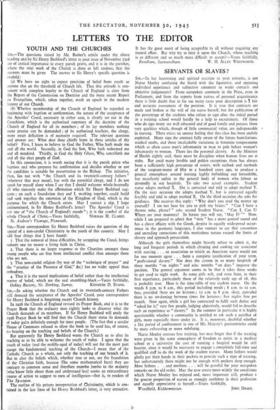LETTERS TO THE EDITOR
YOUTH AND THE CHURCHES
Sta,—The questions raised by Mr. Barker's article under the above heading and by Sir Henry Bashford's letter in your issue of November 23rd are of critical importance to every parish priest, and it is in the parishes, where the vital work of the Church is done or left undone, that the answers must be given The answer to Sir Henry's specific question is twofold: (a) We have no right to expect precision of belief from youth or anyone else on the threshold of Church life. That this attitude is con- sonant with complete loyalty to the Church of England is clear from the Report of the Commission on Doctrine and the more recent Report on Evangelism which, taken together, mark an epoch in the modern history of our Evangelism, (b) Whether membership of the Church of England be regarded as beginning with baptism or confirmation, the nature of the acceptance of the Apostles' Creed, necessary in either case, is clearly set out in the Catechism, which is the authorised summary of the doctrine of the Church of England for all its members ; of its lay members nothing more precise can be demanded ; of its authorised teachers, the clergy, more exact definition is of necessity required. The relevant question and answer are: What dost thou chiefly learn in these articles of thy belief? First, I learn to believe in God the Father, Who bath made me and all the world. Secondly, in God the Son, Who hash redeemed me and all mankind. Thirdly, in God the Holy Ghost, Who sanctifieth me and all the elect people of God. In thl.s connection, it is worth noting that it is the parish priest who baptises and who prepares for confirmation and decides whether or not the candidate is suitable for presentation to the Bishop. The initiative, then, lies not with "the Church and its twentieth-century fathers" (whatever that may mean), but with the parochial clergy, and I do not speak for myself alone when I say that I should welcome whole-heartedly all who sincerely make the affirmation which Sir Henry Bashford sug- gests; on such a foundation they and I, working together, could build and seek together the extension of the Kingdom of God, which is the purpose for which the Church exists. May I correct a slip, I hope unintentional, in Sir Henry Bashford's letter? The Apostles' Creed is not one of "the Church of England's creeds " ; .it is the symbol of the whole Church of Christ.—Yours faithfully, NORMAN H. CLARKE. St. Andrew's Vicarage, Pl3rtnouth.






























 Previous page
Previous page